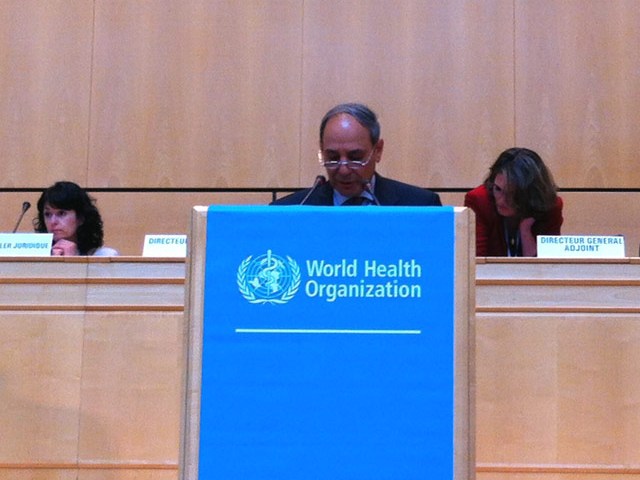Amb Manor addresses 67th session of World Health Assembly
-
Permanent Representative of Israel to the UN, Geneva
-
5/20/2014
GovXShortDescription
Israel congratulates WHO for placing the issue of climate change on the world agenda and for exploring ways to overcome these unpredictable and inevitable phenomena which can have a harmful influence on human health.
-
-

 Amb Manor addresses the World Health Assembly
Copyright: Israel Mission to the UN, Geneva
Amb Manor addresses the World Health Assembly
Copyright: Israel Mission to the UN, Geneva
|
GovXContentSection
Dear Mr. President,
Dear Madame Director General, Dr. Margaret Chan
Distinguished delegates, colleagues,
Ladies and Gentlemen,
In December of last year, the 70 centimeters of snow accumulated in the streets of Jerusalem and on the mountains surrounding it have reminded us all of the potential harmful consequences of climate change on our environment and populations. The frost that covered the transportation network has prevented people from going to work for a few days, and also made it almost impossible for health personnel and patients to reach health facilities. The local authorities set their first priority on clearing the access to health institutions. But the damage to the electricity network kept some of the residents without electricity for a few days, with all the implications.
Therefore, Israel would like to congratulate the World Health Organization for placing the issue of climate change on the world agenda and for exploring ways to overcome these unpredictable and inevitable phenomena which can have a harmful influence on human health.
Israel also wishes to congratulate the Director General for implementing a challenging reform of the WHO system. The Organization, which is 67 years old, the retirement age in our country, has received a boost of energy and become young again.
Madame Director General, under your leadership, the WHO has put people at the center of its activities, stressing performance monitoring, and is focused on planning, managing and implementing changes. We, in Israel, fully support you on this long and winding road which shall lead us to a better and revitalized Organization geared to promote health for all the peoples around the world.
Mr. President,
Given the constant medical, health and economic changes, no country in the world can afford to rest on its laurels, and not to continuously reform its own health system.
Israel is investing resources in integrating the mental health services in its primary and secondary care systems. It is placing particular stress on bridging the health gaps between the rich and the poor, on promoting equity in health services and on coping with non-communicable diseases. Israel’s Ministry of Health is also working on reducing the smoking rate among its population to below 20 percent, and consequently we are now heading towards a reduction of this harmful practice. These reforms are done as part of the action plans led by the WHO.
Mr. President,
Last year has been unique in the relations and cooperation between Israel and the WHO, both in its Geneva headquarters and at the European regional level, in an unprecedented way in the previous half a century. This has taken place within a context of dealing with an infectious disease which was found in the environment without any recorded clinical case.
In light of this unprecedented situation, Israel has asked the help of the WHO, fully and transparently sharing with it data and information. Two WHO missions were sent to Israel to study the unique situation of “polio without polio” cases. Israel has accepted and implemented the recommendations of WHO experts. It was not easy to perform two rounds of the "two drops of OPV (Oral Polio Vaccine)", a technology which has been abandoned almost a decade ago and to go back from being an IPV (inactivated polio vaccine) country to a policy of re-introducing both OPV and IPV vaccines together, which has never been done by any other Member State. In this context, Israel proposes to set an international standard for environmental surveillance for polio virus detection. To conclude, for the last two months, Israel has remained free of this polio virus in the environment.
Mr. President,
Israel has shared all these developments with those neighboring countries with which it has formal relations.
In fact, Israel considers the quest for coping with communicable diseases as an opportunity to cooperate in a practical way with its neighbors without publicity nor political considerations.
We need the leadership of the WHO and the Director General has done the first steps during her visit to Israel. Dr. Chan is the first WHO Director-General to have done so, coming with the Regional Directors of the European and the Middle Eastern Regions. Israel is very grateful for it.
The International Health Regulations also present an opportunity for communication between neighboring countries with the coordination of the WHO. We believe that these ideas do not only constitute a step toward peace in the Middle East, but that they also enable cooperation in order to improve the health and well-being of all the peoples in our region.
Thank you, Mr. President.
-
-
-
-
-
-
-
-
-
-
-
-
-
-
-
-
-
-
-